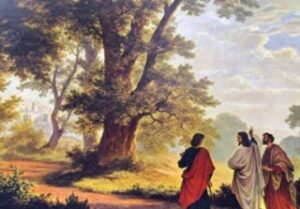 While looking for art for this weeks blogpost, I found this and instantly remembered how many houses I’ve seen this hanging in growing up, and never realized it was the Road to Emmaus. I guess you could say I didn’t recognize it was Jesus.
While looking for art for this weeks blogpost, I found this and instantly remembered how many houses I’ve seen this hanging in growing up, and never realized it was the Road to Emmaus. I guess you could say I didn’t recognize it was Jesus.
This week’s Gospel reading is about Jesus pulling a sneaky on two disciples and showing up on the Emmaus Road with them. While I don’t want to spoil my sermon on this what I will say is I love that Jesus goes to extreme lengths to care for his disciples even when they don’t realize it is him. This is why radical hospitality and welcoming in the stranger is so important to what we do here at Trinity. It is such a common theme in the Christian and Hebrew Bibles, and I’ve written about it before on this blog. Radical hospitality and caring for our fellow strangers could be a life saving event and we do not know it. In her book, There Shall Be No Needy: Pursuing Social Justice through Jewish Law & Tradition” Rabbi Jill Jacobs writes:
“The assertion that human beings are created in the image of God serves as a theological foundation for the obligation to save life. If the destruction of life is viewed as a desecration of God, then the preservation of life can be understood as strengthening the divine presence by maintaining one more instance of God’s image in the world.” Pg. 161
A number of years ago, someone I knew when he saw a friend of his, said hello. His friend broke down in tears because it was the first time in three days that someone had recognized his humanity and status as a child of God. You see, the person I knew worked in one of the missions in Toledo and his friend was a member of the unhoused community. As followers of Jesus we are called to love those that don’t love us, to break bread with those who are sinners, and to care for the least of these. It is incredibly easy for me to write that; the next time you’re downtown say hello to an unhoused person. But what we forget is that, in our every day lives (at work, where we hang out, etc) there are strangers in our midst that we can be open to showing the love of God to.
May we remember as we move forward through this next week, that we are the strangers on the road in Emmaus, listening patiently, caring for those on the journey, and saving lives through small everyday actions.
Grace and peace,
George Benson (he/him)
(“The Road to Emmaus,” an 1877 painting by Robert Zund. Public Domain)
